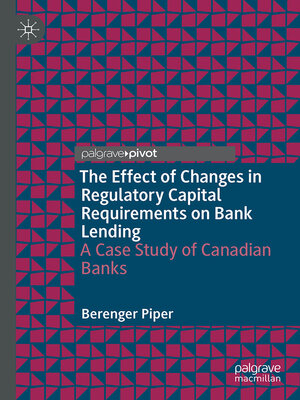The Effect of Changes in Regulatory Capital Requirements on Bank Lending
ebook ∣ A Case Study of Canadian Banks · Economics and Finance
By Berenger Piper

Sign up to save your library
With an OverDrive account, you can save your favorite libraries for at-a-glance information about availability. Find out more about OverDrive accounts.
Find this title in Libby, the library reading app by OverDrive.



Search for a digital library with this title
Title found at these libraries:
| Library Name | Distance |
|---|---|
| Loading... |
This book offers a comprehensive analysis of how changes in microprudential and macroprudential regulations—specifically, regulatory capital requirements—affect the lending behaviour of Canadian banks. Drawing on empirical data, the study explores three key dimensions. Loan Volume: It explores how increases in capital requirements lead to a measurable decline in the volume of gross loans extended to the non-financial sector, even after accounting for macroeconomic conditions. Interest Rates: It examines why, during periods of economic stability, higher capital requirements do not necessarily translate into higher loan interest rates—aligning with findings in the existing literature. Loan Portfolio Composition: It uncovers how different segments of the loan portfolio—Corporate & Commercial Loans, Residential Mortgages, and Consumer/Retail Loans—respond uniquely to regulatory changes, with corporate lending being the most sensitive. The book also examines how economic policy uncertainty and bank profitability influence lending decisions, offering nuanced insights into the interplay between regulation and financial behaviour.
A vital resource for policymakers, regulators, and financial scholars, this work contributes to the limited literature on capital regulation in Canada. It provides practical guidance on how to strengthen financial resilience without stifling the credit needed for economic recovery and growth.







